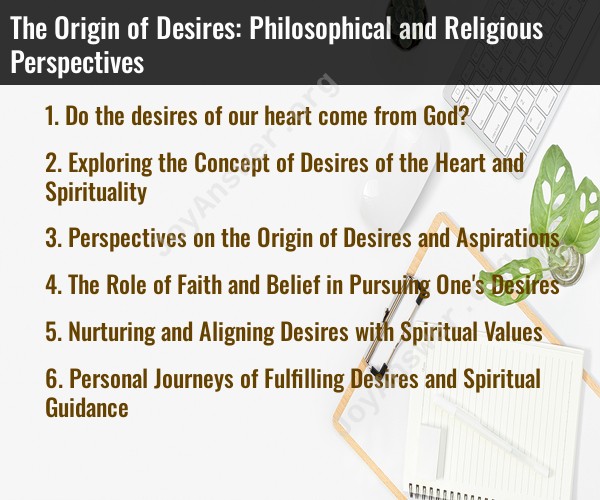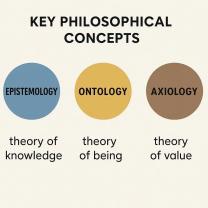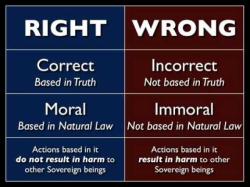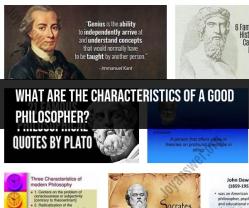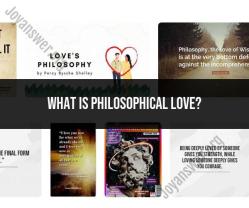Do the desires of our heart come from God?
The idea of whether desires come from a divine source, such as God, is a complex and philosophical question that has been explored in various religious and philosophical traditions. Different belief systems and philosophical perspectives offer different interpretations. Here are some perspectives:
Theistic Religions:
- In many monotheistic religions, such as Christianity, Islam, and Judaism, it is believed that God is the creator of human beings and has a role in shaping human desires. Desires can be seen as a part of God's plan for individuals. In some cases, desires are considered to be both a gift from God and a test of one's faith and self-control. It's also believed that individuals can pray and seek guidance from God to align their desires with God's will.
Eastern Religions and Philosophies:
- In Eastern religions and philosophies like Hinduism and Buddhism, desires are often seen as a part of human suffering (dukkha) and the cycle of reincarnation (samsara). The goal may be to transcend or eliminate desires to attain spiritual enlightenment and liberation (moksha or nirvana). In this context, desires are not seen as coming from a divine source but as part of the human condition.
Secular and Humanistic Philosophies:
- Secular and humanistic philosophies often view desires as arising from natural human inclinations, biological needs, and social conditioning. From this perspective, desires are not necessarily seen as originating from a divine source but as a product of human psychology, culture, and societal influences.
Free Will and Autonomy:
- Some philosophical perspectives, regardless of religious beliefs, emphasize human agency and free will. They argue that individuals have the capacity to shape their desires and make choices based on their values and preferences. In this view, desires may be influenced by a combination of factors, including personal experiences and cultural influences.
Psychological and Scientific Perspectives:
- Psychology and neuroscience offer explanations for the origins of desires based on biological and cognitive processes. Desires are often seen as emerging from the brain and the interplay of various neurotransmitters and neural pathways. These perspectives do not necessarily invoke the divine as the source of desires.
The question of where desires come from is a deeply philosophical and theological one, and different belief systems and individuals may offer diverse interpretations. It often depends on one's worldview and personal beliefs. Some people may see desires as being influenced by divine providence, while others may view them as products of human nature and the environment. Ultimately, it's a matter of personal, religious, and philosophical conviction.
Exploring the Concept of Desires of the Heart and Spirituality
The desires of the heart are the deepest and most authentic longings that we have. They are the things that we truly yearn for, regardless of what others may think or expect of us. Our desires can be for physical, emotional, spiritual, or intellectual fulfillment.
Spirituality is a broad concept that encompasses our beliefs about the meaning and purpose of life, our relationship to ourselves and others, and our connection to something larger than ourselves. It can be expressed through religion, but it can also be lived in a non-religious way.
The desires of the heart and spirituality are often interconnected. Our desires can motivate us to seek spiritual growth and development, and our spiritual practice can help us to clarify and refine our desires.
Perspectives on the Origin of Desires and Aspirations
There are many different perspectives on the origin of desires and aspirations. Some people believe that our desires are innate and stem from our deepest nature. Others believe that our desires are shaped by our experiences and upbringing. Still others believe that our desires are a combination of both innate and environmental factors.
From a spiritual perspective, our desires can be seen as a reflection of our divine essence. They are a way for our soul to communicate with us and guide us on our journey.
The Role of Faith and Belief in Pursuing One's Desires
Faith and belief can play an important role in pursuing one's desires. Faith can give us the courage to take risks and persevere in the face of challenges. Belief can give us direction and purpose.
For example, if someone has a desire to become a doctor, their faith in their ability to achieve their goal may help them to stay motivated through the rigorous demands of medical school. Their belief in the importance of helping others may also give them a sense of purpose.
Nurturing and Aligning Desires with Spiritual Values
It is important to nurture our desires and to align them with our spiritual values. This means being mindful of what we truly want and why we want it. It also means being willing to let go of desires that are not in alignment with our highest good.
Here are some tips for nurturing and aligning our desires with our spiritual values:
- Spend time in reflection and introspection. What are your deepest desires? Why do you want them? What values are important to you?
- Journal about your desires. This can help you to clarify your thoughts and feelings.
- Meditate on your desires. This can help you to connect with your deepest wisdom and intuition.
- Talk to a trusted mentor or spiritual guide. They can offer you guidance and support as you pursue your desires.
Personal Journeys of Fulfilling Desires and Spiritual Guidance
Many people have found that fulfilling their desires can lead to a deeper sense of spiritual connection. When we are living in alignment with our true desires, we are more likely to feel fulfilled and content. We may also find that we are more open to receiving spiritual guidance.
Here are some examples of personal journeys of fulfilling desires and spiritual guidance:
- A person may have a desire to write a book. They may feel that this is their calling, and they may be drawn to it for spiritual reasons. As they work on their book, they may feel guided and supported by their spiritual guides.
- Another person may have a desire to start a business. They may see this as a way to use their talents and gifts to make a difference in the world. As they build their business, they may find that they are able to connect with others in a meaningful way.
- Yet another person may have a desire to travel the world. They may be drawn to different cultures and ways of life. As they travel, they may find that they learn more about themselves and their place in the world.
These are just a few examples of how fulfilling our desires can lead to a deeper sense of spiritual connection. When we are living in alignment with our true selves, we are more likely to experience the joy and abundance that life has to offer.
